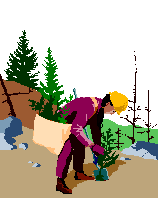 | |
Forest
Myth-
conceptions? | | |

 FORESTRY FORESTRY


 Forestry is a bad
word? Forestry is a bad
word?
Any word can have bad connotations.
Forestry is the art and science of managing trees and forests
for use by people.
In certain respects it is similar to agriculture,
and is sometimes included in it.
Unfortunately,
because of many misconceptions about what “foresters” do,
the term forestry is thought by some people
to be opposed to conservation.
This is partly due to equating forestry
with uncontrolled logging or planting monocultures.

 Foresters cut
down trees? Foresters cut
down trees?
It depends!
Today, the word forester can be applied to
forest labourers, loggers, technicians,
guards, extension workers, sociologists,
managers or advisers.
Depending on what use the forest is to be put,
these people may be directly or indirectly responsible for harvesting trees
- but not only that.
The image of the “forester” being a man (or woman)
whose only tool is an axe never was correct.

 Foresters are not
environmentalists? Foresters are not
environmentalists?
Not true!
Forests are part of the natural environment -
the sum total of the
geological,
biological,
climatic, and
hydrological conditions
in which people and forests live.
So the work of a forester must be
to ensure the conservation of the wider natural environment
and maintain healthy ecosystems.

 Foresters plant
trees? Foresters plant
trees?
Sometimes!
But in many types of forests,
they rely on naturally sown seedlings
to regenerate the forests after harvesting.
And when they do need to plant trees,
it is not always pines or eucalyptus -
there are several hundred species of tree
that have been used for planting.

 Forestry does not mean
conservation? Forestry does not mean
conservation?
When forestry is practised properly,
conservation of trees and forests
is an integral part of the art and science of forestry.

 Foresters are not
conservationists? Foresters are not
conservationists?
Not true!
Even today,
some government forest departments call their more senior managers
“conservator-of-forests”.

 "Conservation" is
not the same as
protection? "Conservation" is
not the same as
protection?
To conserve forests
is to ensure that they remain in perpetuity
for the benefit of people.
Sometimes this means protecting the forest from improper use -
so that the word “protection” includes “conservation”.
 | 
